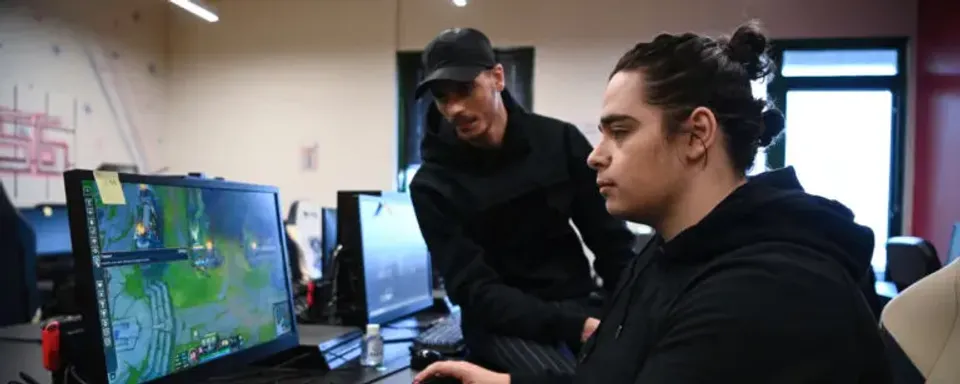Article
09:34, 12.12.2023

American universities have rapidly embraced eSports in recent years. Colleges are fully investing in competitive video gaming, from offering scholarships to constructing luxurious gaming facilities that would captivate any tech enthusiast. Some schools are even incorporating popular games like AviatorGame into their eSports programs, showing just how diverse this digital playing field has become.
eSports: Not the Chess Club
How then did we find ourselves here? From basement LAN events to university-approved varsity teams, it has been quite the trip. Originally small groups of students gathered around screens, what began as a hobby has developed into formal programs with coaches, strict practice schedules, and contests attracting audiences equivalent to those of conventional sports.
Many elements have stoked this gaming fever:
1. The rise of video games—sorry, parents—is unstoppable.
2. Professional eSports leagues and events exploding
3. An expanding employment market in the gaming sector (it's not just for "slackers" nowadays).
4. Universities understand they can draw students and create some major coin
Show me the money or eSports scholarships
Here's when things really start to get interesting now. To entice players on campus, universities are literally handing out cold, hard money. Indeed, being quite proficient in video games qualifies you for a scholarship. What a time to live!
These scholarships range in form and value. While some pay full tuition (cha-ching!), others may merely assist with books and noodles. The hitch is that it's not all fun and games here. Many times, these scholarships include strings attached:
Maintaining your grades — sorry, you cannot just spend all day playing games.
Attending team practices and contests (not napping through your alert)
Being a good sport and promoting your university.

If You Create It, They Will Game: eSports Facilities
Universities are investing in some rather elegant gaming systems in addition to lavishing money on athletes. We are discussing high-tech venues where even the most extreme gamer would weaken in the knees.
Still, it goes beyond hardware here. These initiatives are bringing complete teams of people to assist their digital athletes:
1. Coaches most likely better knowledgeable about strategy than Sun Tzu
2. Team leaders should maintain everyone's organization (herding cats, anyone?)
3. Dietitians must ensure athletes consume foods apart from energy drinks and chips
4. Mental health professionals can assist with the demands of competitive gaming; it's not all fun and games, guys.
Certain colleges are even developing whole academic courses centered on eSports. You may therefore focus on "video games" and, in the end, have a career possibility. Underwater basket weaving is like this.
Games On: Leagues and Competitions
Collegiate leagues and contests are emerging as more colleges get onto the eSports bandwagon. Organizing these digital showdowns is being done by companies like Tespa and NACE (National Association of Collegiate Esports).
These leagues address all kinds of games:
- League of Legends for the strategists
- For the FPS aficionados — Overwatch
- Rocket League — for those who love football and rocket car racing
- Fortnite — since evidently, we needed another justification for children to do victory dances)
- Etc.
What is in it for me: Advantages for Universities and Colleges
You may be asking, "Why should I care about all this?" right now. Well, be ready for plenty of reasons.
For students:
- An opportunity to convert your passion — or gaming addiction — into cold, hard money (or at least less student debt)
- In particular — the chance to play video games wearing a varsity jacket (such a good time!)
- Learning worthwhile abilities include communication, cooperation, and polite trash-talk techniques
- Potential professions in the explosive gaming sector (take over, Silicon Valley)
For universities:
- Attracting a whole fresh audience of students (goodbye, football; hello, Fortnite), keeping existing students interested (and awake during those 8 AM courses)
- Using ticket sales and sponsorships to make money (ka-ching!)
- Looking trendy and groovy to potential students (and their shockingly encouraging parents)

Not All Fun and Games: Problems and Inquiries
Let's pump the brakes now, before we get too carried away, and take some thought on some of the speed bumps on this digital highway:
1. The age-old dilemma: How can one juggle gaming and academics? ( Inquiring of a buddy)
2. The elephant in the room: Why do college eSports's female players count so few? (Time to level up on people's inclusiveness)
3. The parent's nightmare: Regarding all those health problems connected to gaming, (Carpal tunnel is not a joke.)
4. In this new frontier, who writes the rules — the wild west of regulations? (Somebody contacts the sheriff.)
There is even more! The following questions disturb university officials:
5. Is this only a fleeting craze or is the eSports investment sustainable? Magic 8 Ball states, "Ask again later".
6. How can we persuade conventional faculty members of eSports's intellectual worth? (Good fortune in regard to that one.)
7. What happens when a mid-season great player leaves in anger? (Talk about a recruiting nightmare)
8. How should collegiate play manage in-game purchases and microtransactions? Pay-to-win is really not nice.
Crystal Ball Time: The Collegiate eSports Future
Where is all this headed? If I had a crystal ball — or a really decent gaming PC — I could see:
- More colleges — FOMO is true even for universities — are hopping on the eSports bandwagon
- eSports is becoming as frequent on campuses as frisbee on the quad
- The explosive growth of cybersports-related degrees (Bachelor in Memes, maybe?)
- The day you tell your parents you're going to college for gaming doesn't cause fainting
Game Over... or just the beginning?
One thing is abundantly evident as we draw to close this exploration of collegiate eSports: this is not your grandfather's college experience. Including eSports in American colleges marks a dramatic change in our perspective on sports, rivalry, and what it means to be a student-athlete in the twenty-first century.
Indeed, there are problems to solve and questions to answer. But isn't it true of every radical transformation? American colleges are obviously eager to participate, and collegiate eSports has a promising future. On, academics! Game on!







No comments yet! Be the first one to react